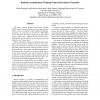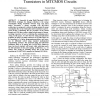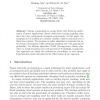BROADNETS
2004
IEEE
13 years 8 months ago
2004
IEEE
This paper presents Random Asynchronous Wakeup (RAW), a power saving technique for sensor networks that reduces energy consumption without significantly affecting the latency or c...
DATE
2007
IEEE
13 years 8 months ago
2007
IEEE
In the past decade, energy-efficiency has been an important system design issue in both hardware and software managements. For mobile applications with critical missions, both ene...
GLOBECOM
2009
IEEE
13 years 8 months ago
2009
IEEE
Underwater communication is a challenging topic due to its singular channel characteristics. Most protocols used in terrestrial wireless communication can not be directly applied i...
ICCAD
2007
IEEE
13 years 8 months ago
2007
IEEE
ICC
2007
IEEE
13 years 8 months ago
2007
IEEE
Abstract-- As the distance between terminals in modern wireless networks tends to decrease, the energy consumption issue, conventionally assumed to be exclusively dominated by the ...
HPCC
2007
Springer
13 years 8 months ago
2007
Springer
Abstract. Energy consumption is a major factor that limits the performance of sensor applications. Sensor nodes have varying sampling rates since they face continuously changing en...
DATE
2009
IEEE
13 years 8 months ago
2009
IEEE
As application complexity increases, modern embedded systems have adopted heterogeneous processing elements to enhance the computing capability or to reduce the power consumption. ...
EMNETS
2007
13 years 8 months ago
2007
Energy is of primary importance in wireless sensor networks. By being able to estimate the energy consumption of the sensor nodes, applications and routing protocols are able to m...
CSE
2009
IEEE
13 years 8 months ago
2009
IEEE
Existing work has been focused on minimizing the number of relay nodes to maintain the connectivity of a sensor network. However, we believe replacing batteries for nodes or redepl...
SPDP
1990
IEEE
13 years 8 months ago
1990
IEEE
This paper provides lower bounds on the energy consumption and demonstrates an energy-time trade-off in optical computations. All the lower bounds are shown to have the matching u...



